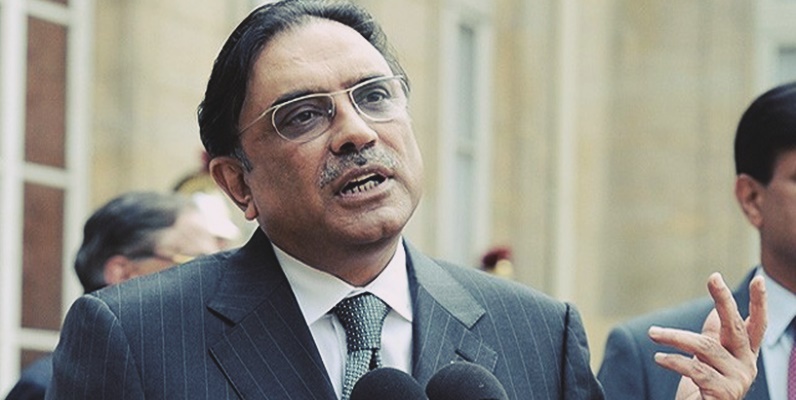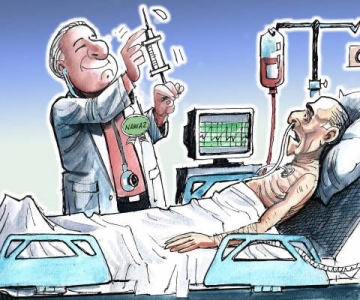The triumph of a popular movement on March 16 has marked a new beginning. The retreat of an intransigent government and the wise response by the PML-N and the lawyers averted a major crisis that could have been violent, and also a potential recipe for harming the parliamentary system in its infancy. There was a sigh of relief among the public for a long-standing issue appeared to have been resolved. This has been a monumental achievement by all standards.
However, the inherent imbalances within Pakistan’s power structure and the state of its polity are yet to be addressed and the contradictions of how our power is exercised stared us as the good news rolled out through the ubiquitous TV channels and their zealous presenters. The way quintessentially political issues and turf-wars between the PPP and PML-N were battled and resolved through a stage-managed process only concealed the bitter power-realities of Pakistan.
The haunting poem of Faiz Ahmad Faiz, “ye daagh daagh ujala…” (This stained light, this night-bitten dawn) came to mind as one followed the trajectory of conflict resolution prior to the historic speech of our well-meaning prime minister. Three unsavoury realities were clear amid the celebrations: that the Army and its chief were dragged into the political-constitutional deadlock; that the governments of the United States and the United Kingdom, ably assisted by their regional ally Saudi Arabia, were directly involved, and that the Parliament was barely a significant forum, not even trusted by its key custodians–i.e., the two mainstream parties.
What was the point of ousting General Musharraf and chanting slogans for the last two years if the political conflict had to be resolved through the fear or acknowledgment of the effective stick that one single institution holds? If the press reports are to be believed, then the claims of changing the “system” and effecting “revolution” fell flat before the diktat of the real power centre. Even this time the nation has clapped. The civvies know how to thunder and squabble. From the time when the East Pakistan Assembly deputy speaker was struck by a chair in the 1950s, which resulted in his death, to the current imbroglio, Pakistan’s political elites remain dangerously undemocratic.
 In 2009, after a series of personal attacks and loud posturing against each other, reminiscent of the dirty politicking of the 1990s, the two sides were cooled down by a force that ought not to have been drawn into the tent. And, within days peace mantras have replaced charges of corruption, betrayals and accusations of power greed. Such opportunism is not out of place here. It is present in our former wing, now Bangladesh, where the two lady politicians and their legendary battles over non-issues led to army intervention a few years ago. India’s regional political leaders are also well known for such mud-slinging, but somehow the strength of democratic institutions prevents the meddling of unelected state institutions. Will our dear leaders learn anything from them?
In 2009, after a series of personal attacks and loud posturing against each other, reminiscent of the dirty politicking of the 1990s, the two sides were cooled down by a force that ought not to have been drawn into the tent. And, within days peace mantras have replaced charges of corruption, betrayals and accusations of power greed. Such opportunism is not out of place here. It is present in our former wing, now Bangladesh, where the two lady politicians and their legendary battles over non-issues led to army intervention a few years ago. India’s regional political leaders are also well known for such mud-slinging, but somehow the strength of democratic institutions prevents the meddling of unelected state institutions. Will our dear leaders learn anything from them?
If Mr Zardari had to restore the judges at the end of the day, then why was the matter dragged for so long? And if the PML-N leaders were such believers in the system, then why did they push it towards the third force? Further, how do the constitutionalists feel about the covert extra-constitutional interventions by the very institution that has historically undermined the judiciary? Ironic that yesterday’s villains are today’s saviours.
The second worrying aspect of the saga as it unfolded was the direct intervention of the second all powerful “A” in Pakistan’s domestic affairs. What were the calls by Ms Clinton and Mr Holbrooke all about? Surely, such hectic communications were not made to enquire about the weather conditions in Islamabad. Again, our information is limited to media reporting, and once again the cliché that after Allah the Almighty the American factor remains as strong as ever. We had wished that such ramblings were to end up in the dustbin of history, but this remains a distant dream. Each time some regional or international imperative becomes an excuse for our recourse to strategic and external friendly advice. Why are we always hell-bent on making ourselves a laughing stock that we cannot handle our affairs? The results of foreign “help” this time were good for us, but we could have definitely avoided such meddling that only makes us look like a basket case in the eyes of the world. Yet again, this happened after many statements of not taking dictation from outside powers.
Finally, the Senate, whose seats were rather amicably “shared” by the bourgeois democrats a few days before the street confrontation, proved to be a useless body to resolve this political question. The same is true for the National Assembly that remained a debating club for the elected elites throughout the crisis. The numbers with the opposition were not insignificant. By the setting of a dangerous precedent of use of the street, a new chapter has been scripted which is going to haunt the incoming governments, assuming that we let the system continue and do not deliver it to our traditional saviours.

It is too early to comment on the predictions of the PPP’s imminent destruction that are being profusely aired in the media. This is nothing new for the PPP, or for that matter any other major political force. In 1999, the same media gurus who are now saluting the PML-N leadership had written off the Sharif brothers, saying that their party will disintegrate. It is true that the usual opportunist suspects ditched the party and formed a new PML faction. But the Sharifs’ appeal refused to die down. If anything, by fuelling and facilitating the demise of the PPP, sections of the media are sensationalising political rifts that will only help those who set the rules and outcomes of anti-democratic games.
Suffice it to say that the undermining of the parliamentary institutions in the recent political storm has been ominous. It only reconfirms that our parties, other than practicing little or no democracy within their ranks, have modest faith in the institutions that they pay lip-service to.
In this gloomy scenario, the Charter of Democracy and its varied provisions provide a silver lining. Only, if the charter is not selectively interpreted or used for yet another reason for intra-systemic collision. Sadly, there is now enough evidence to suggest that another confrontation might not be far away. A year has been wasted by two parties that failed to realise that their cooperation in 2008 was in the national interest. But such a vision proved to be incompatible with personal ambitions, power-territories and old-school politics.
However, with the threats of rising violence and extremism, and a crumbling economy, the country cannot afford another systemic shock. For the results this time will be disastrous for the survival and integrity of Pakistan. There may be no room left for such power games to be played if tunnel-visions continue to steer politics.
We fervently hope that our leaders and their dynastic parties are reading such clear signs of our unfortunate times.
First published in The NEWS
Raza Rumi blogs at www.razarumi.com and edits Pak Tea House and Lahore Nama e-zines. Email: razarumi@gmail.com



